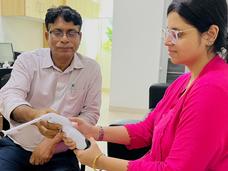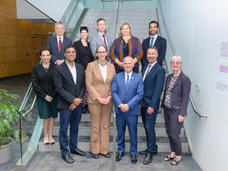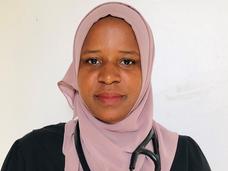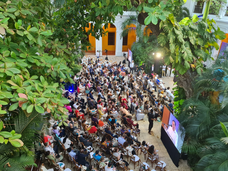CGH Spotlight Blog
The CGH Spotlight Blog showcases innovative research and notable developments from the global cancer community.
-
Building a Global Network: How a Cancer Research Training Community of Practice is Empowering Early-Stage Investigators
A community rooted in shared experiences, the Global Cancer Research Training Community of Practice, was formed in April 2024 to build a network of early-stage investigators committed to careers in global cancer research. In a recent discussion, Community of Practice Steering Committee members reflect on what this community has meant to them over the past year.
-
The Crucial Role of Research in Addressing Global Cancer Stigma
Despite the significant global impact, cancer stigma remains an under-researched topic, with insufficient measurement instruments, and a shortage of evidence-based mitigation interventions. In response, the National Cancer Institute has begun implementing efforts to support researchers and practitioners in advancing the global field of cancer stigma research.
-
Developing a Low-Cost Portable Technology to Treat Cervical Precancer
Low-resource regions around the globe face a high cervical cancer burden. As such, an affordable, portable, and easy-to-use technology was necessary to address the global cervical cancer burden. Born out of a partnership between investigators at University Teaching Hospital in Zambia and the International Agency for Research on Cancer in France, the TC Thermocoagulator was a much-needed development for treating cervical precancers and accelerating elimination of cervical cancer as a global health problem.
-
Tribute to Professor Lynette Ann Denny: A Courageous Warrior for Women’s Health
Lynette “Lyn” Denny passed away at her home in Cape Town, South Africa on June 9, 2024. Throughout her career, Lyn stood firm against injustice and worked tirelessly to forge a new future for women's health. Lyn’s spirit lives on, as we continue to strive for a world in which there is equitable access to the highest quality care for all persons regardless of where in the world they live.
-
NCI and WHO Renew Commitment to Collaboration through the WHO Collaborating Center for Global Cancer Control
Following a re-designation in March 2024, the NCI WHO Collaborating Center for Global Cancer Control enters its third designation period, from 2024-2028. Doug Perin J.D., M.P.H., and Kalina Duncan, Dr.P.H., M.P.H., reflect on the accomplishments of this eight NCI-WHO year partnership and look towards a future of continued support for global cancer control efforts.
-
Trainee Spotlight: Marriam Mponda, M.B.B.S.
Marriam Mponda, M.B.B.S., is a doctor and scholar studying clinical oncology, to develop the skills and expertise needed to improve the lives of people impacted by cancer. Through her studies and participation in research with UNC Project Malawi, Dr. Mponda is realizing her dreams of advancing cancer research and care in her home country of Malawi.
-
Changing the Trajectory of the Global Tobacco Epidemic
Friday, May 31st is World No Tobacco Day (WNTD), an annual day dedicated to fighting the global tobacco epidemic. In recognition of WNTD 2024, Dr. Mark Parascandola charts the trajectory of the global tobacco epidemic and current global efforts for tobacco control. This year, WNTD is committed to protecting youth from tobacco industry interference.
-
Global Forum Strengthens Commitments Towards Cervical Cancer Elimination
Dr. Julia Gage reflects on the significant commitments made towards cervical cancer prevention and control at the Global Cervical Cancer Elimination Forum in Cartagena, Colombia. This forum convened governments, international health organizations, and civil society members devoted to the acceleration of global cervical cancer elimination efforts.
-
Trainee Spotlight: Asteria Kimambo, M.D., M.Med.
Dr. Asteria Kimambo is a scholar with a strong commitment to improving the quality of cancer screening and diagnostic services through locally relevant implementation research. As part of a cancer research training program in Tanzania (D43), Dr. Kimambo studies the cost-effectiveness of fine-needle aspiration biopsy for cancer diagnostics. She aims to create a reproducible resource-adapted intervention strategy to address challenges for cancer care in Tanzania and globally.
-
Cathy Muha, Branch Director and Dedicated Public Servant, Retires
Cathy Muha, R.N., M.S.N. retires after 37 years of dedicated service to the National Cancer Institute. The Center for Global Health (CGH) recognizes Cathy as an exemplary public servant and a pillar at the CGH for the last 10 years. Cathy, an oncology nurse by training, has demonstrated a profound commitment to improving the lives of people with cancer worldwide.










